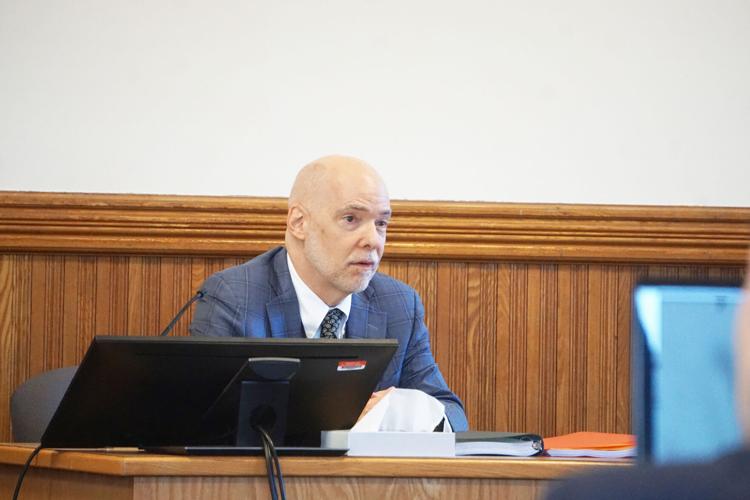LACONIA — The defense rested their case in the second trial of Hassan Sapry on Thursday morning, following the testimony of a psychological expert who told jurors the defendant's insanity defense is legitimate.
Sapry, 27, is charged with eight counts, including first- and second-degree murder. On Tuesday, Belknap Superior Court Judge Elizabeth Leonard dismissed one charge of falsifying physical evidence related to a cellphone owned by the victim, Wilfred Guzman Sr., which Sapry apparently threw into Lake Winnisquam in April 2019, days after the murder.
State prosecutors Jeffery Strelzin and Alexander Kellermann allege Sapry killed Guzman Sr., 58, a friend, in a frenzy in the early hours of April 18, 2019, in Guzman Sr.'s Blueberry Lane apartment, after the two engaged in an argument about religion. Sapry, through defense attorneys Mark Sisti and Amy Ashworth of Sisti Law Offices, raised a not guilty by reason of insanity defense.
“Mr. Sapry’s actions were a product of his mental illness,” Dr. Eric Drogin, a forensic and clinical psychologist, told jurors in court on Thursday.
The state’s expert psychiatrist, Dr. Albert Drukteinis, is expected to testify on Friday morning when the trial resumes.
Drogin told jurors it is clear Sapry suffers from post-traumatic stress disorder, obsessive-compulsive disorder and depression. Some of those conditions originated from experiencing traumatic events in war-torn Iraq before the fall of Saddam Hussein’s regime and after the 2003 invasion.
Sapry was born and raised in Baghdad, Iraq. His family fled persecution after his father — who worked as a bodyguard for a coalition embassy — was kidnapped and tortured. They made their way to a refugee camp in Damascus, Syria, before moving into an apartment complex with other Iraqis, eventually settling in Laconia in 2008.
Drogin first heard about Sapry’s case in the summer of 2019 and met him, performing an initial examination, on Aug. 6 of that year.
“He was still injured at the time,” Drogin said.
Psychologists conduct a battery of tests in such situations, Drogin said, aiming to gauge the relative levels of depression an individual is experiencing, how they were feeling at a discrete moment in time, and if they’re attempting to fake or exaggerate symptoms. In 2019, Drogin ran Sapry through the paces of such a battery, and concluded Sapry was not faking or exaggerating his symptoms.
“It also gives you a hint as to what was going on in the longer term,” he said, noting Sapry was in what is considered the “mid-range of disturbance” psychologically.
There were no indications Sapry considered self-harm or felt hopeless — in fact, he expressed considerable optimism about the future. He exhibited anxiety in the normal range, too.
“This is a person of approximately average intelligence,” Drogin said, adding that rather than attempting to exaggerate his symptoms, Sapry tended to downplay them, convincing himself and others he was faring better than he actually was.
Drogin met with Sapry over a dozen times, and developed an understanding of his background and personal history. Since he was about 13 years old, Sapry told Drogin, he’d experienced thoughts and feelings, wondering what it would feel like to kill another.
When he was somewhere between 7 and 9 years old, his school in Iraq was “blown up,” and he witnessed the death of his best friend on that day and the deaths of other classmates, and continued to see images of those children and hear their screams and cries in his dreams for years thereafter.
In his own words, Sapry experienced “horrible thoughts” on a daily basis.
Drogin verified the claims of those experiences and interviewed Sapry’s brother and parents in the course of his evaluation.
The state’s expert, Drukteinis, apparently diagnosed Sapry with PTSD and, Thursday, Drogin said he agreed. Sapry is experiencing PTSD, Drogin said, which can be caused by exposure to actual or threatened death, sexual violence, or witnessing violent or traumatic acts.
PTSD alters an individual's behavior, causing intrusive thoughts or memories, invades dreams, causing dissociative reactions and psychological distress. Individuals suffering PTSD may experience physical reactions or situation avoidance, and altered moods or cognition, resulting in exaggerated negative beliefs and confusion regarding the source of the ailment.
Depression can accompany PTSD, leaving an individual feeling detached from interests and other people, unable to enjoy experiences, exhibiting irritable behavior and angry outbursts, acting recklessly or in a self-destructive manner, and can result in sleeplessness and hyper-vigilance.
Over three or four months of working with Sapry, Drogin said he saw many of those symptoms, noting he’d quit jobs and college — he previously sought to become a history teacher — and Druktneinis apparently agreed.
The doctors also agree Sapry suffers from OCD, experiencing recurrent, persistent, unwanted and intrusive thoughts, and trying to neutralize those obsession with compulsions — behaviors an individual feels driven to perform — that do not connect in any real way to what they’re meant to alleviate.
In the hours after his arrest on April 26, 2019, Sapry’s responses in a State Police interview indicated mental illness, too, Drogin said, and Sapry described a loss of control in the killing.
Sapry, while working with Drogin, would go on to say he felt worthless after the killing, and the killing itself was worthless. He was shocked he’d killed someone he cared for and was deeply remorseful for his actions, stating he’d never forgive himself. He expressed concern about what his own family would think of him.
“He did not describe himself as at all happy with what he had done,” Drogin said.






















(0) comments
Welcome to the discussion.
Log In
Keep it Clean. Please avoid obscene, vulgar, lewd, racist or sexually-oriented language.
PLEASE TURN OFF YOUR CAPS LOCK.
Don't Threaten. Threats of harming another person will not be tolerated.
Be Truthful. Don't knowingly lie about anyone or anything.
Be Nice. No racism, sexism or any sort of -ism that is degrading to another person.
Be Proactive. Use the 'Report' link on each comment to let us know of abusive posts.
Share with Us. We'd love to hear eyewitness accounts, the history behind an article.